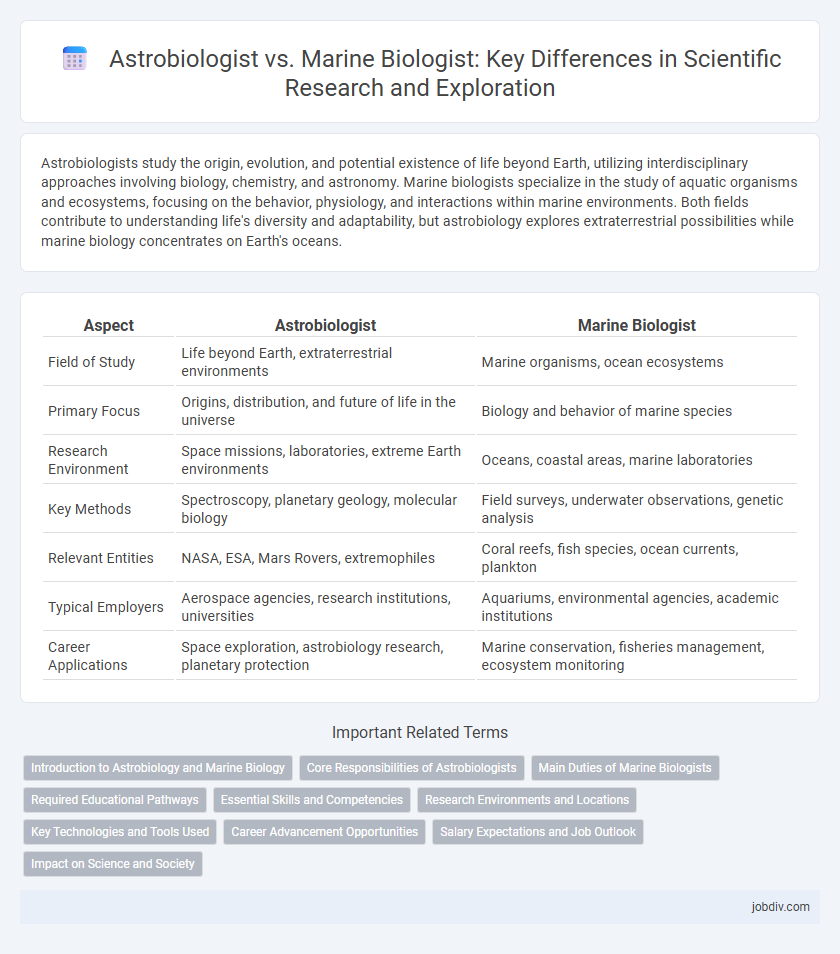Astrobiologists study the origin, evolution, and potential existence of life beyond Earth, utilizing interdisciplinary approaches involving biology, chemistry, and astronomy. Marine biologists specialize in the study of aquatic organisms and ecosystems, focusing on the behavior, physiology, and interactions within marine environments. Both fields contribute to understanding life's diversity and adaptability, but astrobiology explores extraterrestrial possibilities while marine biology concentrates on Earth's oceans.
Table of Comparison
| Aspect | Astrobiologist | Marine Biologist |
|---|---|---|
| Field of Study | Life beyond Earth, extraterrestrial environments | Marine organisms, ocean ecosystems |
| Primary Focus | Origins, distribution, and future of life in the universe | Biology and behavior of marine species |
| Research Environment | Space missions, laboratories, extreme Earth environments | Oceans, coastal areas, marine laboratories |
| Key Methods | Spectroscopy, planetary geology, molecular biology | Field surveys, underwater observations, genetic analysis |
| Relevant Entities | NASA, ESA, Mars Rovers, extremophiles | Coral reefs, fish species, ocean currents, plankton |
| Typical Employers | Aerospace agencies, research institutions, universities | Aquariums, environmental agencies, academic institutions |
| Career Applications | Space exploration, astrobiology research, planetary protection | Marine conservation, fisheries management, ecosystem monitoring |
Introduction to Astrobiology and Marine Biology
Astrobiology explores the origin, evolution, and potential existence of life beyond Earth by studying extreme environments on Earth and analyzing extraterrestrial materials. Marine biology concentrates on the study of marine organisms, their behaviors, and ecosystems, emphasizing biodiversity in oceanic environments. Both disciplines use interdisciplinary approaches but differ in their primary focus: astrobiology centers on life's cosmic context, while marine biology focuses on aquatic biological processes and ecosystems.
Core Responsibilities of Astrobiologists
Astrobiologists study the origin, evolution, and potential for life beyond Earth by analyzing extraterrestrial environments and planetary data collected through space missions and telescopes. They investigate extreme habitats on Earth as analogs for possible life forms on other planets, integrating disciplines such as microbiology, geology, and chemistry to understand life's adaptability. Their research contributes to identifying biosignatures and informs the search for habitable exoplanets in the field of astrobiology.
Main Duties of Marine Biologists
Marine biologists specialize in studying ocean ecosystems, focusing on the behavior, physiology, and interactions of marine organisms such as fish, coral, and marine mammals. Their main duties include conducting field research, collecting and analyzing biological samples, and monitoring environmental changes that affect aquatic life. These specialists often collaborate with conservation efforts to protect endangered species and maintain biodiversity in marine habitats.
Required Educational Pathways
Astrobiologists typically require advanced degrees in fields such as biology, chemistry, astronomy, or planetary science, often culminating in a Ph.D. focused on extraterrestrial life or related research areas. Marine biologists generally pursue a bachelor's degree in marine biology or biology, with many advancing to master's or doctoral programs specializing in marine ecosystems, oceanography, or aquatic species. Both careers demand strong foundational knowledge in biology and research methodologies, but astrobiology emphasizes cross-disciplinary studies involving space sciences, whereas marine biology centers on aquatic organism and habitat studies.
Essential Skills and Competencies
Astrobiologists require a strong foundation in astronomy, geology, and biology to analyze extraterrestrial life potential, complemented by skills in data interpretation and remote sensing technologies. Marine biologists specialize in aquatic ecosystems, demanding expertise in marine species behavior, ecological sampling techniques, and underwater research methods. Both fields emphasize critical thinking, proficiency in scientific research, and adaptability to complex, interdisciplinary environments.
Research Environments and Locations
Astrobiologists conduct research primarily in extreme environments such as deep-space analog sites, hydrothermal vents, and arid deserts to study life's potential beyond Earth, often collaborating with space agencies and planetary missions. Marine biologists focus on diverse aquatic ecosystems including coral reefs, open oceans, and coastal habitats, utilizing research vessels, underwater submersibles, and laboratory aquaria for studying marine organisms and their ecological interactions. Both fields rely heavily on interdisciplinary methods but differ significantly in their primary investigative settings and the scope of life forms they examine.
Key Technologies and Tools Used
Astrobiologists utilize spectrometers, planetary rovers, and advanced telescopes to analyze extraterrestrial environments and detect potential biosignatures. Marine biologists rely on remotely operated vehicles (ROVs), underwater drones, and sonar mapping systems to explore ocean habitats and study aquatic life. Both fields employ genetic sequencing technologies to investigate the origins and adaptations of life forms in their distinct environments.
Career Advancement Opportunities
Astrobiologists advance by engaging in interdisciplinary research, securing grants for space missions, and contributing to planetary exploration programs that expand their role in astrobiology missions. Marine biologists progress through field research, specializing in ecosystem studies or marine conservation, often advancing into leadership positions in environmental agencies or academic institutions. Both careers offer unique opportunities for growth, with astrobiologists leaning towards space agencies and research labs, while marine biologists frequently move into governmental or nonprofit environmental management roles.
Salary Expectations and Job Outlook
Astrobiologists typically earn between $60,000 and $110,000 annually, with job growth driven by advancements in space exploration and the search for extraterrestrial life. Marine biologists have a median salary around $63,000, with steady demand linked to environmental conservation and marine ecosystem research. Both fields require specialized education, but marine biology offers more established career paths and greater employment opportunities worldwide.
Impact on Science and Society
Astrobiologists expand scientific understanding of life's origins and potential extraterrestrial existence, influencing space exploration and fueling societal interest in the cosmos. Marine biologists drive advancements in biodiversity conservation and climate change mitigation by studying ocean ecosystems, significantly impacting environmental policies and sustainable resource management. Both disciplines foster interdisciplinary research, shaping educational priorities and inspiring global efforts to preserve life on Earth and beyond.
Astrobiologist vs Marine Biologist Infographic

 jobdiv.com
jobdiv.com